Can digestive enzymes actually help with leaky gut? And if so, how do they work and what sort of supplement should we be looking for? We’re going to answer all of these questions in this ultimate guide to digestive enzymes and leaky gut!
Last Updated: Mar 28, 2024

In this guide, you’ll discover…
Whilst L-Glutamine and probiotics steal all the leaky gut spotlight (there is such a thing, I think), our little friends, digestive enzymes, go unappreciated.
Most people write into me wondering “Digestive enzymes, what are they actually good for?”.
My answer…absolutely everything!
You see, digestive enzymes can take the food we eat and help to break it down into individual nutrients so our body can actually absorb and use the ‘goodness’ in the food we eat, eg amino acids, vitamins, minerals etc1.
Without digestive enzymes you could eat like Gwyneth Paltrow all day long and still be unhealthy, since the body is missing out on all the nutrition locked in the food.
Focusing on digestive enzymes – especially a broad spectrum blend of enzymes like these digestive enzymes – can be a game changer, so let’s dive in.
P.S. to discover my very best ideas, download a copy of my free leaky gut recovery guide here.
Digestive enzymes can help support our gut health in many ways. But when it comes to leaky gut specifically, the 5 major benefits are…
- Help us absorb more nutrients – enzymes can support the break down of the food we eat into nutrients2, which our body can then use to grow stronger. In fact, for those of us with leaky gut this absorption and utilization of nutrients is so important because it helps our gut lining to repair and thus contributes to stopping leaky gut itself3.
- Less irritation and inflammation – by helping to properly break down the food we eat (into smaller particles), enzymes can also ensure less irritation and thus inflammation of the gut lining, which further regulates gut permeability4.
- Less food-related immune system reactions – enzymes can make sure large food molecules are not making their way through the gut wall and into the bloodstream, which could potentially then wreak havoc on the immune system. This part is important, as it has been associated with the development of autoimmune responses5. Sure, some molecules will still be getting through whilst your gut is repairing, but since they are smaller thanks to digestive enzymes, they are not going to do as much damage.
- Support lining of the gut – digestive enzymes also work to clean up the mucosal lining – and even your bloodstream – by breaking down food and, in the process, removing toxins and harmful proteins6, while also destroying bad bacteria7. This added help is fantastic as it gives your liver and immune system a much needed break! (Like a spa weekend for your vital organs, kinda)
- Protect against pathogens – enzymes can also help the body weed itself of pathogens that may contribute to leaky gut. This is because bacteria and parasites are made of lipids and proteins, and thus protein-digesting enzymes (protease) and even bile salts8 can help break them down and flush them out.
It sure does.
In fact, a healthy body is pretty good at producing digestive enzymes by itself thanks to your salivary grands, stomach, pancreas and small intestine.
Unfortunately if you are suffering from leaky gut, then the systemic inflammation of your digestive tract and damage done to the microvilli along your intestinal lining, along with related conditions like Celiac disease9, Crohn’s10 or SIBO11 etc, can reduce your ability to produce digestive enzymes.
And when you add in underlying problems often suffered by people with leaky gut, eg chronic stress, alcohol/NSAID/acid-blockers use12,13,14, then you really start to see the digestive enzyme factory slowing down!
Aging doesn’t help either. In fact, by the time you hit middle age (45-55) your enzyme production decreases15 and problems such as chronic pancreatitis can cause some enzymes to drop by approx 50%16.
Can’t I just eat more foods rich in digestive enzymes?
Not really.
Foods like sauerkraut, kefir, avocado, bananas and pineapple17, will naturally carry a good amount of digestive enzymes themselves.
But these tend to be only the type of enzymes needed to digest that specific food.
For example, avocados come with lipase enzymes18, which help digest the fat in the avocado, but do not appear to have other enzymes that are helpful for our digestive processes. So it is not going to help tremendously with the digestion of other foods you eat in the same meal.
The other big thing with these types of enzyme-rich foods is that they tend to also be high in sugar.
For example, a banana may come with some helpful enzymes, but it will also give you about 14g of sugar in one medium banana19.
So arguably, any enzyme benefits received are often off set by the sugar.
7 popular foods that are high in enzymes
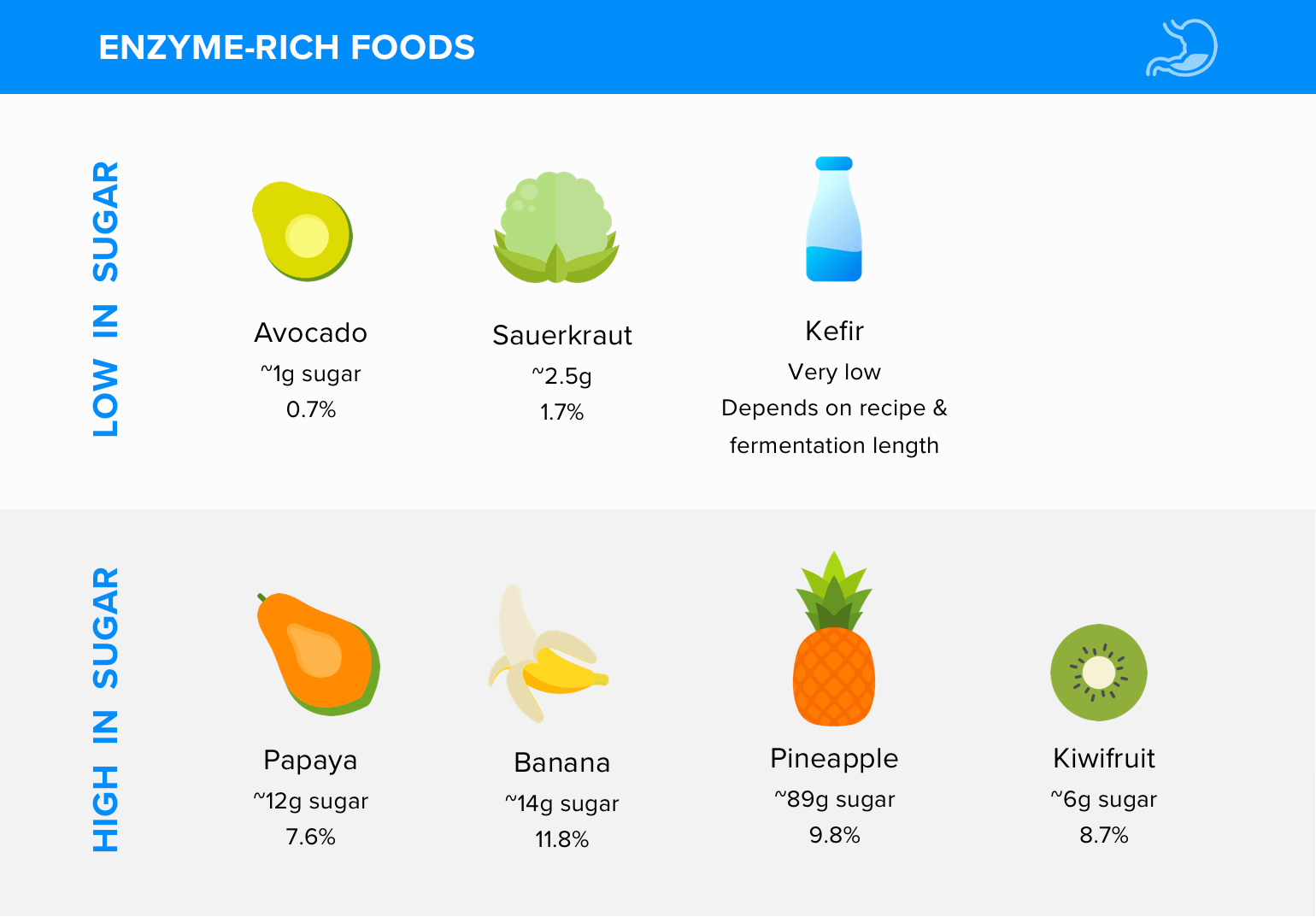
Whilst there are other foods that are enzyme-rich, most of them are either grain based or tend to need cooking.
Now, the problem with grains and leaky gut is obvious, particularly for experiencing chronic inflammation, which is now more common than ever20. Meanwhile, the problem with cooking other foods is that due to the heating process you basically kill the natural digestive enzymes in them.
Also, enzyme levels in fruits and vegetables tend to be quite low, therefore you can’t realistically eat enough enzyme-rich raw foods to make up for the deficiency in enzyme production caused by leaky gut.
To help your body get back to doing what it does best (producing its own digestive enzymes) we need to try and stop the intestinal hyperpermeability (aka leaky gut) and thus inflammation itself. To do this, consider…
- The elimination diet I talk about in the free leaky gut recovery guide
- Avoiding gluten, grains, legumes, dairy, sugar etc for 30-90 days
- Reinoculate your gut with good bacteria, by eating probiotic-rich foods like sauerkraut and kimchi, and taking a multi-strain high-strength probiotic, like this one my research team and I designed
- Address other underlying causes of leaky gut and decreased enzyme production, like chronic stress, excessive alcohol or NSAID use etc.
These days I see so many people eating on the go or sitting down for 5 minutes to vacuum up their lunch, and I’m not surprised gut health is in decline.
That’s because this style of ‘eat-n-run’ means the body is constantly under stress, both in terms of physically moving and the mind never resting.
And when the body is in this sort of constant ‘low level fight or flight’ mode, it is not allocating resources to digestive enzyme production…instead it’s too busy trying to survive!
So instead of eating your salad with a side serving of ‘fight or flight’, try some good ol ‘rest and digest’.
(And yes, I know that’s lame. But I hope its ‘lameness’ helps you remember it).
In a perfect world I would eat every meal like this
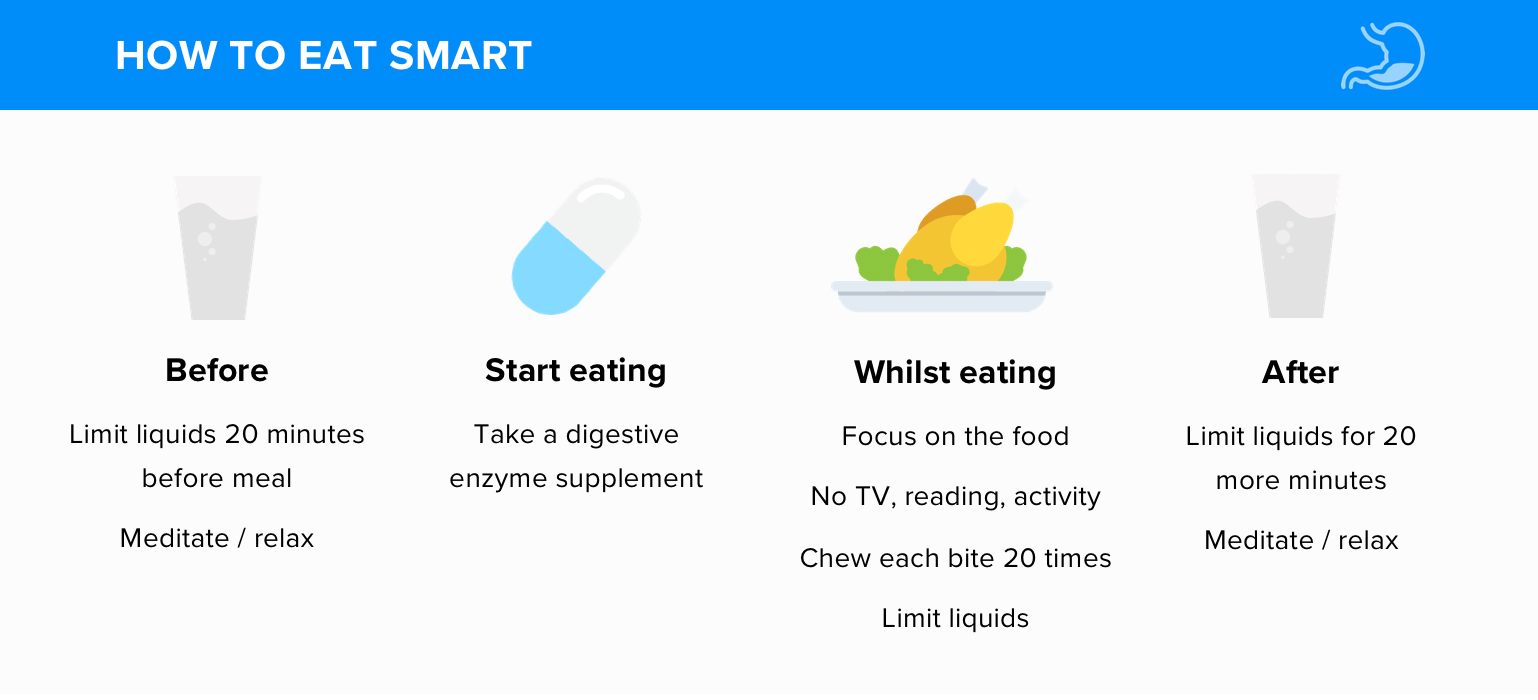
- Limit liquids – before sitting down to eat, I would make sure to limit my liquids. So that means not drinking too much water, tea etc in the 20 minutes preceding my meal. The reason for this is that liquids can dilute our stomach acid, and thus decrease our gut’s ability to digest and breakdown food in the first stage of digestion21.
- Relax – during this time I’d also do 5 minutes of meditation or light breathing exercises. Basically the idea is to get myself out of any stressed mindset from work, so that my system can give its full focus towards digesting when I start eating.
- Enzyme supplement – as I sit down to eat, I would take a digestive enzyme supplement like this one. Sending a few extra of the good guys down there will give me a great head start.
- Mindful eating – then I would start eating and making sure to have no external stimulation (eg TV, walking, internet etc). i.e. just me and my food. This monk-like focus might sound extreme, but in doing this I’ll ensure my body starts the enzyme production asap (especially with amylase enzymes in my saliva) and once again, less stress will mean the body can really focus on digestion.
- Chew, chew, chew – whilst eating I’d chew every bite 20 times. Just like a mini Gandhi, who famously said ‘chew your liquid and drink your meals’. By pulverising my food better, my stomach acid and enzymes will have less break down work to do. So as you can see it really is a team effort, and the more we do, the better the team does!
- Hot liquids (if needed) – throughout my meal I would continue to limit liquids. If I do want to take a few sips of liquid, I’d tend towards a hot drink like tea. That’s because cold water can tend to slow digestion, eg it can solidify fats in the foods we’re eating. Not great team work!
- Relax a bit more – finally, after finishing my meal, I would do 5-10 minutes of meditation and light breathing exercises. The important thing with any breathing exercises at this point, is to really make sure they’re light and not belly-implodingly heavy! Breath focused meditation is a sweet spot.
Admittedly, this mini Buddha-Gandhi lovechild eating routing doesn’t always happen. Life has a way of compressing eating windows from time to time!
But when I suffered leaky gut I made sure to at least pay careful attention to my liquid intake before, during and after a meal. This one simple trick can really works wonders!
And if you can add in the other tips as much as possibly, then you will take a huge amount of stress off your body’s digestive system and even allow it to produce more digestive enzymes itself.
The right diet, the right way of eating and the right lifestyle, may still not be enough to help your body produce enough digestive enzymes. That’s because leaky gut, and its knock on effects, are a tough adversary to overcome.
And although I do think with enough time you could probably beat it without supplements, why wait?
(I know when my gut was at it’s worst, patience was not a virtue I had time for!)
Also, unlike many other supplements for leaky gut, the very first time you take digestive enzymes you will likely notice it.
Not in terms of noticing more nutrient absorption (which is more felt on a cellular level), but rather in terms of not noticing many of the after effects of eating with a leaky gut, eg heartburn, stomach pains etc.
Everyone is of course different, but this is my experience with taking them.
How a digestive enzyme supplement can help
Since digestive enzyme supplements will help break your food down faster AND especially in your stomach, they can reduce the number of large food particles that make it down to your gut/intestine. This mans less irritation and inflammation of the gut lining/intestinal wall22.
In addition, you should notice that feeling of having ‘a brick in your stomach’ disappear within days of starting to take digestive enzymes (not weeks).
Digestive enzyme supplements also help leaky gut, because they give your GI tract a head start!
Unsurprisingly, supplementing with digestive enzymes can also help your body clean up Candida yeast overgrowth, since yeast-fighting enzymes like proteases can break down the shell of the yeast cells since proteins are a major part of their cell wall23, thus exposing them so anti-fungal products can then finish them off.
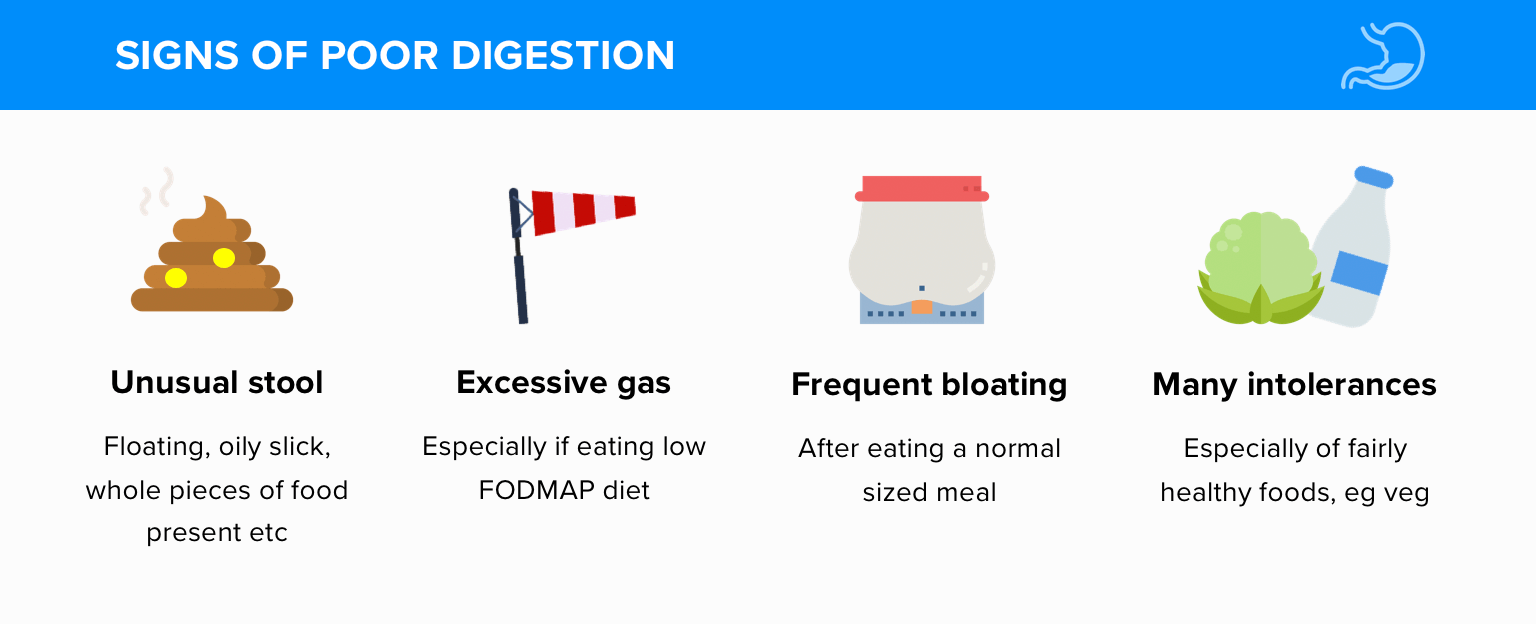
1) Unusual stool
If you find yourself depositing alien-looking stool into ye olde throne rather often, you might well be struggling to digest foods properly.
Now you could work with your doctor to do a formal stool test. As this would take a very close look to see if foods are being sufficiently broken down into nutrients or not.
But these tests can be notoriously inaccurate and miss many existing issues – so, if you want to save yourself the money, then just keep an eye on your poop!
Unusual stools may indicate poor digestion24, especially if they are:
- Too runny or with an oily slick appearance on the surface of the water in the toilet
- Too buoyant
- Too coarse, especially if to the point you see bits of whole foods in your stool
- Too infrequent, ie constipation
2) Excessive gas
If your partner is just about ready to adopt the family dog out because you’ve been passing the blame to poor puppy McSmoogles for all your flatulence, then it might be a sign of poor digestion25.
This is especially true if you find yourself passing a lot of wind when you have NOT been eating the typical gas-causing culprits like garlic, beans, dairy and other high FODMAP foods, or excess fiber or protein.
Supplementing with digestive enzymes can help with gas, even when you’re eating a few of the usual gas culprits, which is pretty cool! For example…
- Lactase enzymes can help break down dairy’s troublesome lactose26
- Alpha galactosidase enzymes can support break down of fiber rich foods like beans27
- Protease enzymes can aid with protein digestion28
So leave poor McSmoogles alone, and just grab yourself a quality supplement with these enzymes in it, like these digestive enzymes.
3) Frequent bloating
If you find yourself knocking around with a mini food baby in your belly after eating a fairly normal meal, you are likely experiencing poor digestion, especially in terms of speed – and thereby leading to bloating29.
I know for me personally, the clearest sign I needed to supplement with enzymes was bloating. That constant feeling of pressure in my stomach, even when I hadn’t eaten much, was all I needed to confirm my suspicions.
But of course, the easiest way for me to know for sure, was to try taking some digestive enzyme supplements and see how I then felt – whilst maintaining a similar eating pattern.
And wow did I feel a difference!
It was almost as though someone popped my little ‘buddha belly balloon’ (as I like to fondly call it) and relived the pressure. This of course had a flow on effect, which felt great too if you know what I mean!
4) Many food intolerances
If you find yourself responding badly to a lot of different foods (eg gas, reflux, diarrhea etc), it may also be down to poor digestion.
Supplementing with digestive enzymes can have a dramatic impact on intolerances because they deliver more of the specific enzymes you need to break down these foods, especially harder to digest ones, like those in dairy as we talked about above30.
For me personally, label recommendations were not initially enough when I was experiencing gut issues.
Instead, I opted for a slightly higher dose, which was based on how my body responded to the pills.
Through some experimentation I basically kept upping the dosage until the signs of poor digestion / breakdown of food, disappeared.
How I decided the right amount of digestive enzymes for me
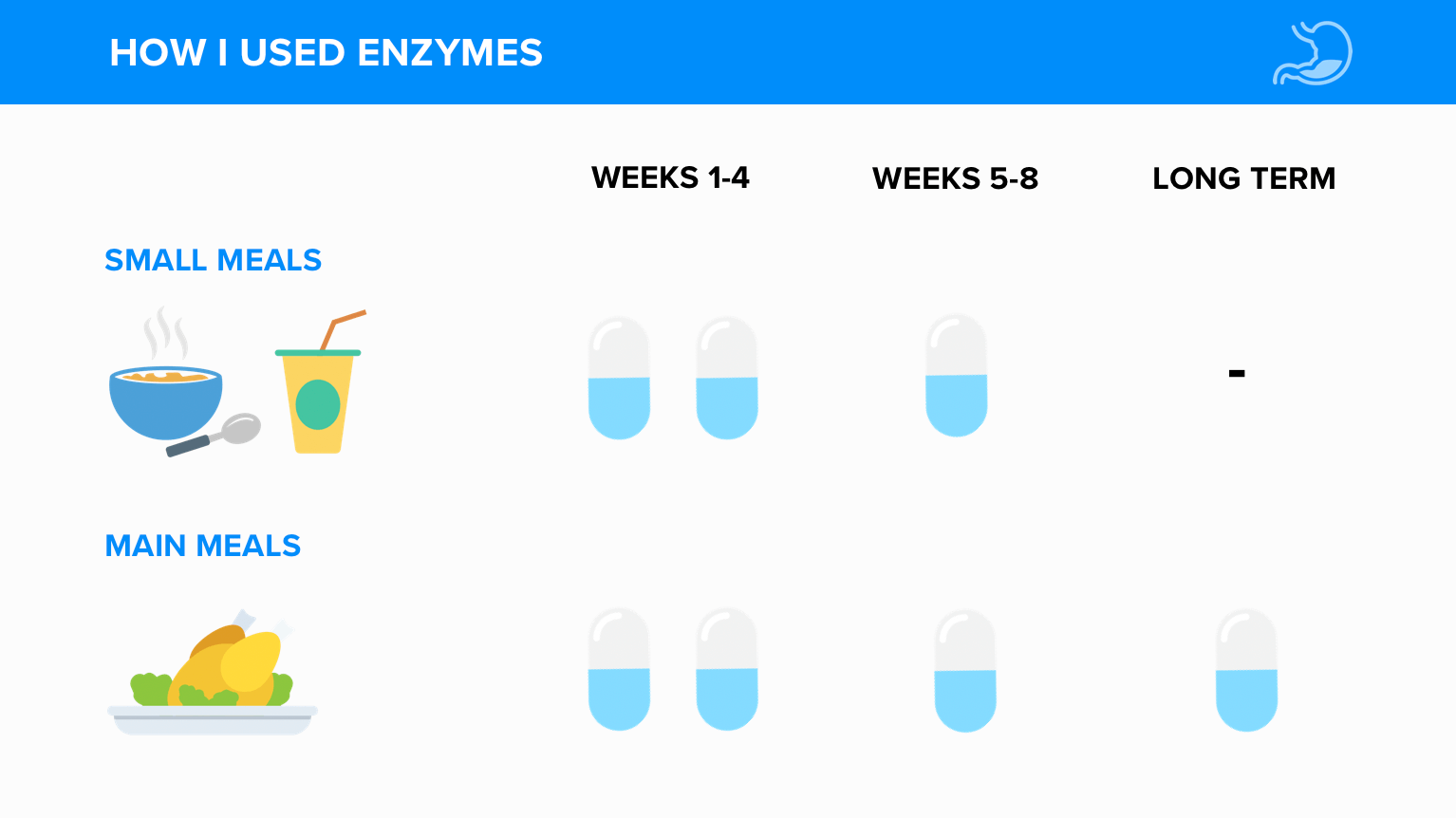
As you can see from the above graphic, this approach saw me initially taking double the label recommendation before each meal (as that’s when I was able to say goodbye to post-meal bloating!).
Thankfully this was only necessary for approx 4 weeks, as my gut health began to improve and my body started to naturally come back into balance. After the first 4 weeks, my body was happy with just 1 before each meal.
During my periods of poor digestive health (ie those first 4 weeks) I also opted to take digestive enzymes with smaller meals, eg a protein shake.
But now that my gut is in better health I only take 1 pill with each main meal, and take no enzymes with small meals like a bowl of soup or a green shake.
So basically if you’re anything like me, you’ll probably want to take a little more than the label recommends during the first few weeks and then see how you go.
Particularly because the main reason I see people report little success with digestive enzymes is simply because they are under dosing.
But with all of that said, it really comes down to the potency of the digestive enzyme supplement you take. ie high quality / potent formulas like this one, will require less capsules, than standard enzyme formulas.
So make sure to pay carefully attention to the enzyme activity amounts stated on the back of labels, and NOT the mg amounts stated.
There’s a lot of debate about when is the best time. Should you take them between meals, just before, during or even after?
From my experience and that of readers, the best time seems to be right when you sit down for your meal.
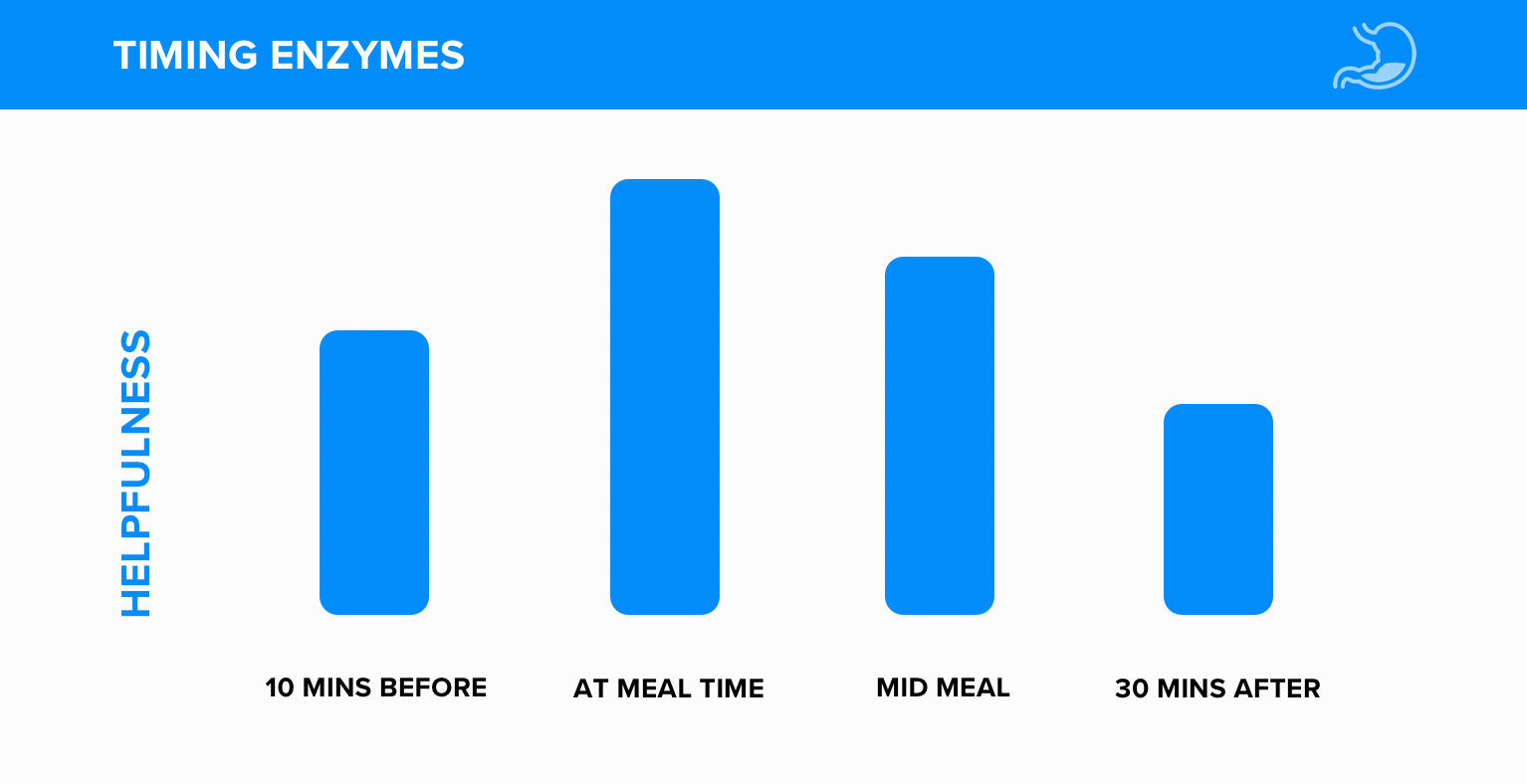
Sometimes I forget to take them of course. And when that happens I’ll just take one when I remember. There is no harm in taking one half way through a meal or even at the end, it just may not help as much with digestion as it would otherwise.
Of course, some people also take them in between meals on purpose. Their goal is not to aid digestion though. Instead, they are using them for detoxification benefits.
You see, when taken on an empty stomach and not near food, enzymes (especially protease enzymes that break down protein) will be absorbed and taken up into the bloodstream, where they can provide direct help to the immune system31, thereby helping with inflammation and giving your liver and immune system some much needed help.
The coolest thing of all is that they are very selective.
So whilst they’ll help to remove and flush toxins out of the body, they’ll leave you with good tissue and healthy red blood cells to carry on32.
There are so many different digestive enzyme supplements on the market that it can be extremely confusing to work out which is best for you.
In fact, if you look at most brands they often sell half a dozen different enzyme supplements themselves!
Here’s the good news…
…There are actually only 3 different sources of digestive enzymes. So once you work out which one of these three is best for you, things get a lot easier.
1) Choose your source of enzymes
a) Fruit based digestive enzymes, eg papaya/papain or pineapple/bromelain
Some people react really well to these. They seem to get the job done.
But out of the three types of digestive enzymes, these are arguably the weakest. And if you have leaky gut, this may not work hard enough to help your system feel better.
You could start out with these and see how you feel of course. And most good enzyme supplements, do include some Papain and Bromelain in them as an insurance policy of sorts.
b) Animal based digestive enzymes, eg pancreatin
Obviously if you’re vegetarian, or even vegan, skip this.
However, for the rest of us, these digestive enzymes can have a good impact on our digestion, especially when it comes to the digestion of protein and breaking down of food at the first stage of digestion (in the stomach).
c) Plant based digestive enzymes – plant or microbe/fungal/seed based
We’ve arrived. This is the Nirvana of digestive enzymes. I’m actually serious.
Because with plant based digestive enzymes we enjoy a triple treat…
…as they survive digestion well, have a broad spectrum of action (importantly they start working in the stomach just BEFORE the food hits the intestines and approx 1 hour before your own pancreatic enzymes show up) and they are very stable (especially across a wide pH range).
Now you know the source you want to go for, its time to work out which types of enzymes you want.
2) Choose your types of enzymes
For example, there are enzymes for breaking down proteins called proteases, and then there are ones for breaking down fats called lipases etc.
If you search for digestive enzymes online you’ll find many only offer one or two types of enzymes, whilst others offer multiple enzymes. So what’s best?
Easy. Always go for a product with multiple enzymes (ideally over 10) and that covers all 4 food groups.
To help you work this out, here are the 4 types of food and my favorite enzymes within each group.
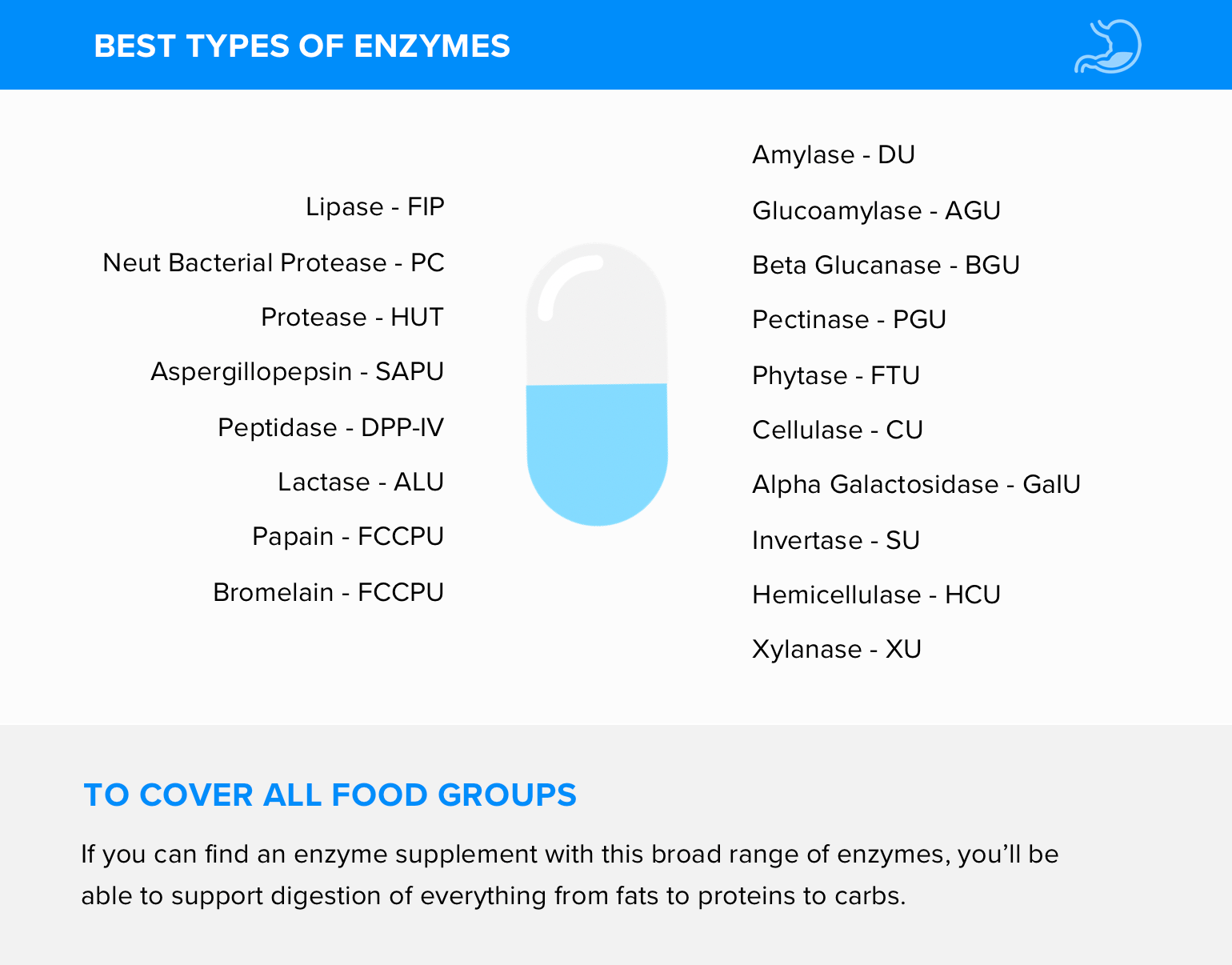
a) Enzymes for protein digestion
To help digest your meat, fish, eggs, and any other protein-containing foods, you’ll want a product with protease enzymes33.
Ideally you would look for a mix of alkaline, neutral and acid functioning proteases, so that you’ve got support digesting protein regardless of your stomach’s acidity levels.
b) Enzymes for fat digestion
To help you here, you’ll want an enzyme supplement with lipase. Good news is there is nothing else to look for here, as fat-digesting enzyme qualities don’t vary in the same way that protein and carbohydrate digesting enzyme qualities do.
Lipase enzymes for the win!
c) Enzymes for carb digestion
It gets a bit more complicated here.
So as a starting point, you’ll want to find an enzyme product with amylase enzymes. They are very important for breaking down starches into sugars and they do a great job of supplementing the enzymes naturally created in our saliva34.
But if you want to make sure you’re really breaking down all carbs, including sugars (normal sugar, milk sugar, malt sugar etc), then you should also look out for glucoamylase, lactase and invertase/sucrase enzymes35 as well.
There are a few others to consider, but these are the big hitters.
d) Enzymes for fiber digestion
Like with carbs, these enzymes can be a bit of a head scratcher.
But the key enzyme to look out for is cellulase, as this little superhero is going to help us break down the fiber in fruits, vegetables, grains and seeds36 – especially important for getting all the goodness from our veggies.
Some other useful enzymes here would be hemicellulase37, xylanase38, pectinase39, phytase40 and alpha-Galactosidase41.
3) Choose your potency of enzymes
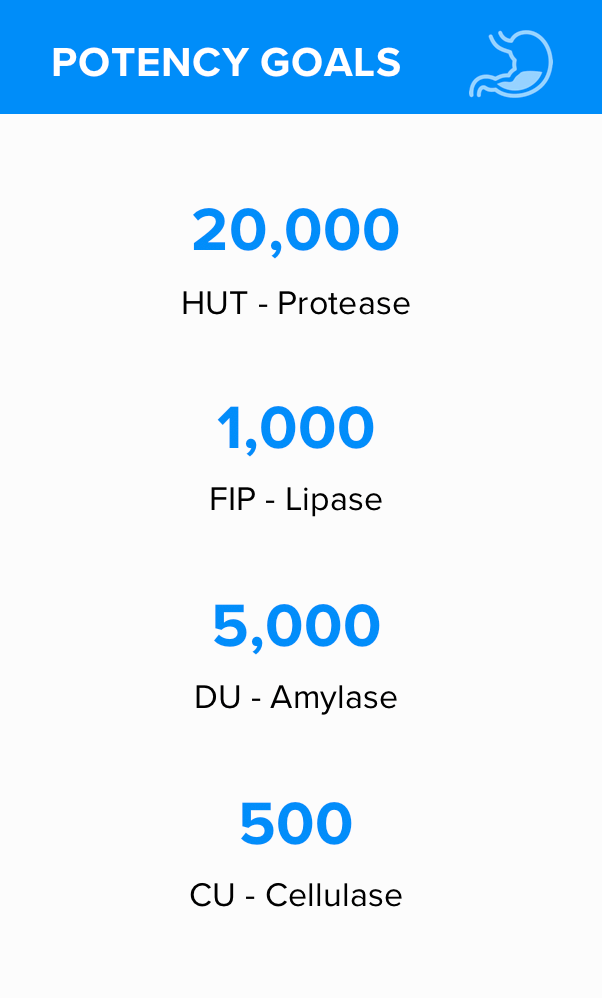 So now you know what type of enzyme source to go for (plant based) and which specific enzymes to look out for (a mix of 10 or more enzymes to cover all 4 food groups), the last thing to think about is potency.
So now you know what type of enzyme source to go for (plant based) and which specific enzymes to look out for (a mix of 10 or more enzymes to cover all 4 food groups), the last thing to think about is potency.
i.e. how much of the enzymes are in a product.
Importantly, you need to look at enzyme activity, NOT mg, when assessing potency. That’s because activity levels show how much the enzyme can digest, as opposed to simply how much it weighs.
Many supplement companies out there rely on you not knowing this, so they boast about dose weight. (Hint: if they do this, their enzymes are usually weak in terms of potency/activity measures).
Measuring potency is important for us because with leaky gut you are likely looking for some serious help and weakly dosed supplements are not going to be ideal.
To keep things simple I’ll give some potency targets for the 4 big enzymes, because if a product hits these benchmarks, it will likely do the same for the other enzymes in the formula. Note: these are ‘per serving’ potency targets.
So ideally you want to find a product that has 20,000 HUT (protease), 1000 or more FIP (lipase), 5000 DU (amylase) and 250 or more CU (cellulase).
If a formula is hitting those targets for the 4 kings of enzymes, it’s a good indication that the formulators know exactly what they are doing and the enzyme blend will likely also do the same for other supporting enzymes.
So which digestive enzyme supplement do I recommend?
Up until recently I struggled to find a specific product that met all the points above, ie plant based, 10+ multiple enzymes & correctly dosed.
Unfortunately the market is just saturated with weak, low quality digestive enzymes.
Worse yet, most of the enzymes on the market contain gluten, dairy and soy – not so great for those of us with leaky gut right!
So together with my research team we decided to create our own high quality & hypoallergenic digestive enzyme complex.
Here is a little bit more info about it
- Plant based – making it very effective at working throughout the GI tract and at different stages of digestion. Plus also suitable for vegetarians.
- Powerful & diverse mix of enzymes – this digestive enzyme supplement contains 18 different plant-based digestive enzymes in each capsule, including all of the enzymes mentioned above, and is dosed even higher than the amounts recommended above in order to maximize noticeable effects.
- Supports all types of meals – it provides you with support across all food groups and in optimal amounts. From your morning shake to evening steak salad, you’re covered.
- Gluten, dairy and soy free – just as importantly, the team and I worked extremely hard to make sure this product was gluten free, dairy free AND soy free, in order to create a supplement that’s hypoallergenic and suitable for sensitive individuals (like us!). And gee, this was not easy – thanks in no small part to the sources of fermentation media used in the enzyme creation process. But after spending months working with an expert team of formulators and the most experienced enzymes manufacturer in the USA, we got there!
Click here to purchase on Amazon
I’m very proud of the product we’ve made, but I wanted you to be 100% sure it met our claims. So we had it independently tested for allergens by SORA Laboratories LLC – perhaps the best allergen tester of enzymes in the country.
And I’m delighted to say it passed with flying colors. Making it exactly the kind of product I would take and give to my family – and now recommend to you.
Because this formula has all the enzymes you want and none of the allergens you don’t. And if you’re interested you can learn more about it here on Amazon.
References
- Goodman BE. Insights into digestion and absorption of major nutrients in humans. Advances in physiology education. 2010 Jun;34(2):44-53.
- Ianiro G, Pecere S, Giorgio V, Gasbarrini A, Cammarota G. Digestive enzyme supplementation in gastrointestinal diseases. Current drug metabolism. 2016 Feb 1;17(2):187-93.
- De Santis S, Cavalcanti E, Mastronardi M, Jirillo E, Chieppa M. Nutritional keys for intestinal barrier modulation. Frontiers in immunology. 2015 Dec 7;6:612.
- Van Spaendonk H, Ceuleers H, Witters L, Patteet E, Joossens J, Augustyns K, Lambeir AM, De Meester I, De Man JG, De Winter BY. Regulation of intestinal permeability: The role of proteases. World journal of gastroenterology. 2017 Mar 28;23(12):2106.
- Fasano A. Leaky gut and autoimmune diseases. Clinical reviews in allergy & immunology. 2012 Feb 1;42(1):71-8.
- Markell LK, Wezalis SM, Roper JM, Zimmermann C, Delaney B. Incorporation of in vitro digestive enzymes in an intestinal epithelial cell line model for protein hazard identification. Toxicology in Vitro. 2017 Oct 1;44:85-93.
- Mullish BH, McDonald JA, Pechlivanis A, Allegretti JR, Kao D, Barker GF, Kapila D, Petrof EO, Joyce SA, Gahan CG, Glegola-Madejska I. Microbial bile salt hydrolases mediate the efficacy of faecal microbiota transplant in the treatment of recurrent Clostridioides difficile infection. Gut. 2019 Oct 1;68(10):1791-800.
- Mullish BH, McDonald JA, Pechlivanis A, Allegretti JR, Kao D, Barker GF, Kapila D, Petrof EO, Joyce SA, Gahan CG, Glegola-Madejska I. Microbial bile salt hydrolases mediate the efficacy of faecal microbiota transplant in the treatment of recurrent Clostridioides difficile infection. Gut. 2019 Oct 1;68(10):1791-800.
- Bethune MT, Khosla C. Oral enzyme therapy for celiac sprue. InMethods in enzymology 2012 Jan 1 (Vol. 502, pp. 241-271). Academic Press.
- Carrette O, Favier C, Mizon C, Neut C, Cortot A, Colombel JF, Mizon J. Bacterial enzymes used for colon-specific drug delivery are decreased in active Crohn’s disease. Digestive diseases and sciences. 1995 Dec 1;40(12):2641-6.
- Augustyn M, Grys I, Kukla M. Small intestinal bacterial overgrowth and nonalcoholic fatty liver disease. Clinical and experimental hepatology. 2019 Mar;5(1):1.
- Slyepchenko, A., Maes, M., Jacka, F.N., Köhler, C.A., Barichello, T., McIntyre, R.S., Berk, M., Grande, I., Foster, J.A., Vieta, E. and Carvalho, A.F., 2017. Gut microbiota, bacterial translocation, and interactions with diet: pathophysiological links between major depressive disorder and non-communicable medical comorbidities. Psychotherapy and psychosomatics, 86(1), pp.31-46.
- de Timary P, Leclercq S, Stärkel P, Delzenne N. A dysbiotic subpopulation of alcohol-dependent subjects. Gut microbes. 2015 Nov 2;6(6):388-91.
- Bhatt AP, Gunasekara DB, Speer J, Reed MI, Peña AN, Midkiff BR, Magness ST, Bultman SJ, Allbritton NL, Redinbo MR. Nonsteroidal anti-inflammatory drug-induced leaky gut modeled using polarized monolayers of primary human intestinal epithelial cells. ACS infectious diseases. 2018 Jan 12;4(1):46-52.
- Laugier R, Bernard JP, Berthezene P, Dupuy P. Changes in pancreatic exocrine secretion with age: pancreatic exocrine secretion does decrease in the elderly. Digestion. 1991;50(3-4):202-11.
- Keller J, Layer P. Human pancreatic exocrine response to nutrients in health and disease. Gut. 2005 Jul 1;54(suppl 6):1-28.
- Dimidi E, Cox SR, Rossi M, Whelan K. Fermented Foods: Definitions and characteristics, impact on the gut microbiota and effects on gastrointestinal health and disease. Nutrients. 2019 Aug;11(8):1806.
- Tursi JM, Phair PG, Barnes GL. Plant sources of acid stable lipases: potential therapy for cystic fibrosis. Journal of paediatrics and child health. 1994 Dec;30(6):539-43.
- Hermansen K, Rasmussen O, Gregersen S, Larsen S. Influence of ripeness of banana on the blood glucose and insulin response in type 2 diabetic subjects. Diabetic Medicine. 1992 Oct;9(8):739-43.
- Gearry RB, Irving PM, Barrett JS, Nathan DM, Shepherd SJ, Gibson PR. Reduction of dietary poorly absorbed short-chain carbohydrates (FODMAPs) improves abdominal symptoms in patients with inflammatory bowel disease—a pilot study. Journal of Crohn’s and Colitis. 2009 Feb 1;3(1):8-14.
- Karamanolis G, Theofanidou I, Yiasemidou M, Giannoulis E, Triantafyllou K, Ladas SD. A glass of water immediately increases gastric pH in healthy subjects. Digestive diseases and sciences. 2008 Dec 1;53(12):3128-32.
- Fasano A. Leaky gut and autoimmune diseases. Clinical reviews in allergy & immunology. 2012 Feb 1;42(1):71-8.
- Chaffin WL. Candida albicans cell wall proteins. Microbiol. Mol. Biol. Rev.. 2008 Sep 1;72(3):495-544.
- Madisch A, Andresen V, Enck P, Labenz J, Frieling T, Schemann M. The diagnosis and treatment of functional dyspepsia. Deutsches Ärzteblatt International. 2018 Mar;115(13):222.
- Madisch A, Andresen V, Enck P, Labenz J, Frieling T, Schemann M. The diagnosis and treatment of functional dyspepsia. Deutsches Ärzteblatt International. 2018 Mar;115(13):222.
- Lomer MC, Parkes GC, Sanderson JD. lactose intolerance in clinical practice–myths and realities. Alimentary pharmacology & therapeutics. 2008 Jan;27(2):93-103.
- Anguah KO, Wonnell BS, Campbell WW, McCabe GP, McCrory MA. A Blended-Rather Than Whole-Lentil Meal with or without α-Galactosidase Mildly Increases Healthy Adults’ Appetite but Not Their Glycemic Response. The Journal of nutrition. 2014 Dec 1;144(12):1963-9.
- Goodman BE. Insights into digestion and absorption of major nutrients in humans. Advances in physiology education. 2010 Jun;34(2):44-53.
- Madisch A, Andresen V, Enck P, Labenz J, Frieling T, Schemann M. The diagnosis and treatment of functional dyspepsia. Deutsches Ärzteblatt International. 2018 Mar;115(13):222.
- Ianiro G, Pecere S, Giorgio V, Gasbarrini A, Cammarota G. Digestive enzyme supplementation in gastrointestinal diseases. Current drug metabolism. 2016 Feb 1;17(2):187-93.
- Lorkowski G. Gastrointestinal absorption and biological activities of serine and cysteine proteases of animal and plant origin: review on absorption of serine and cysteine proteases. International journal of physiology, pathophysiology and pharmacology. 2012;4(1):10.
- Lorkowski G. Gastrointestinal absorption and biological activities of serine and cysteine proteases of animal and plant origin: review on absorption of serine and cysteine proteases. International journal of physiology, pathophysiology and pharmacology. 2012;4(1):10.
- Goodman BE. Insights into digestion and absorption of major nutrients in humans. Advances in physiology education. 2010 Jun;34(2):44-53.
- Goodman BE. Insights into digestion and absorption of major nutrients in humans. Advances in physiology education. 2010 Jun;34(2):44-53.
- Goodman BE. Insights into digestion and absorption of major nutrients in humans. Advances in physiology education. 2010 Jun;34(2):44-53.
- Lorkowski G. Gastrointestinal absorption and biological activities of serine and cysteine proteases of animal and plant origin: review on absorption of serine and cysteine proteases. International journal of physiology, pathophysiology and pharmacology. 2012;4(1):10.
- Sheng P, Li Y, Marshall SD, Zhang H. High genetic diversity of microbial cellulase and hemicellulase genes in the hindgut of Holotrichia parallela larvae. International journal of molecular sciences. 2015 Jul;16(7):16545-59.
- La Grange, D.C., Pretorius, I.S., Claeyssens, M. and Van Zyl, W.H., 2001. Degradation of Xylan to d-Xylose by Recombinant Saccharomyces cerevisiae Coexpressing the Aspergillus niger β-Xylosidase (xlnD) and the Trichoderma reesei Xylanase II (xyn2) Genes. Appl. Environ. Microbiol., 67(12), pp.5512-5519.
- Garg G, Singh A, Kaur A, Singh R, Kaur J, Mahajan R. Microbial pectinases: an ecofriendly tool of nature for industries. 3 Biotech. 2016 Jun 1;6(1):47.
- Dersjant‐Li Y, Awati A, Schulze H, Partridge G. Phytase in non‐ruminant animal nutrition: a critical review on phytase activities in the gastrointestinal tract and influencing factors. Journal of the Science of Food and Agriculture. 2015 Mar 30;95(5):878-96.
- Geng X, Tian G, Zhao Y, Zhao L, Wang H, Ng TB. A Fungal α-Galactosidase from Tricholoma matsutake with broad substrate specificity and good hydrolytic activity on raffinose family oligosaccharides. Molecules. 2015 Aug;20(8):13550-62.
